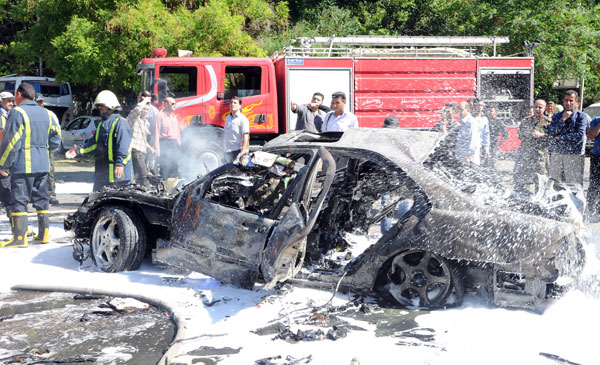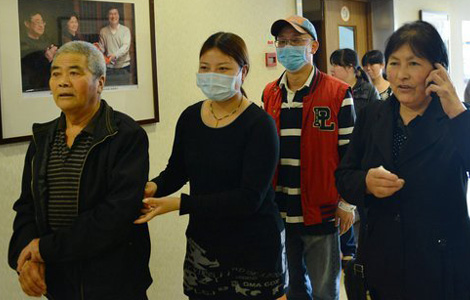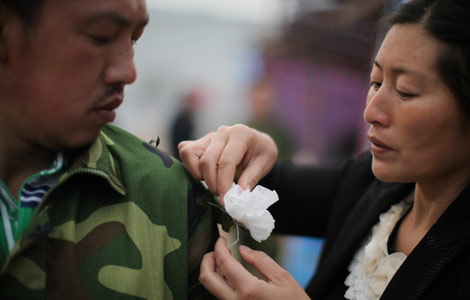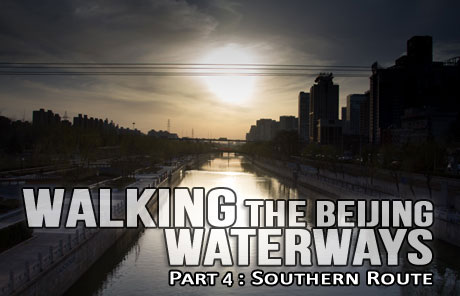Syrian PM survives attack
Updated: 2013-04-30 01:25
(Agencies in Beirut and Moscow)
|
||||||||
State TV reports casualties, but says Halki unhurt
 |
|
Firefighters douse the scene following an attempted assassination of the Syrian prime minister in the Mezze district of Damascus on Monday. The prime minister, Wael al-Halki, apparently escaped unhurt, Syrian state television reported. AFP PHOTO / SANA /HO |
Syrian Prime Minister Wael al-Halki survived a bomb attack on his convoy in Damascus on Monday, state media and activists said, as rebels struck in the heart of President Bashar al-Assad's capital.
The explosion shook the Mezze neighborhood shortly after 9 am local time, sending a plume of thick black smoke into the sky, Internet footage posted by opposition activists showed.
"The terrorist explosion in al-Mezze was an attempt to target the convoy of the prime minister. Doctor Wael al-Halki is well and not hurt at all," state television said.
Syria's Al-Ikhbariya television later broadcast footage of Halki, who looked and sounded composed and unruffled, chairing an economic committee at the prime ministry.
Mezze is part of a shrinking "Square of Security" in central Damascus, where many government and military institutions are based and where senior Syrian officials live.
Sheltered for nearly two years from the bloodshed and destruction ravaging much of the rest of Syria, it has been slowly sucked into violence as rebel forces based to the east of the capital launch mortar attacks and carry out bombings in the once-insulated city centre.
Assad has lost control of large areas of northern and eastern Syria, faces a growing challenge in the southern province of Deraa, and is battling rebels in many cities.
But his forces have been waging powerful ground offensives, backed by artillery and air strikes, against rebel-held territory around the capital and near the central city of Homs which links Damascus to the heartland of Assad's minority Alawite sect in the mountains overlooking the Mediterranean.
Most rebel fighters are from Syria's Sunni Muslim majority.
The United Nations says more than 70,000 people have been killed in Syria's civil war. Five million people have fled their homes, including 1.4 million refugees in nearby countries, and war losses are estimated at many tens of billions of dollars.
The Beirut-based UN Economic and Social Commission for Western Asia estimates that 400,000 houses have been completely destroyed, 300,000 partially destroyed and a further half million suffered some kind of structural damage.
Russian warning
Russia on Monday warned the West against using a search for weapons of mass destruction in Syria as an excuse for ousting Assad along the lines of the notorious hunt for deadly arms in Saddam Hussein's Iraq.
Russian Foreign Minister Sergei Lavrov questioned why UN Secretary-General Ban Ki-moon was calling for a fact-finding mission in Syria by citing unproven claims of the government's use of chemical weapons in December.
"This demand by the secretary-general with reference to a forgotten episode reminds us a great deal of attempts in Syria to introduce a practice analogous to that which existed in Iraq, when they were looking for weapons of mass destruction there," Lavrov told reporters.
Russia was strongly opposed to the US-led invasion of Iraq in 2003 that toppled Saddam Hussein and has bitterly resisted foreign intervention in its close Middle East ally Syria.
Lavrov accused some governments and other players of using the threat of chemical warfare as a pretext for insisting on a foreign invasion of Syria.
"There are governments and outside players that believe that all means are appropriate to overthrow the Syrian regime," said Lavrov, apparently referring to Western and anti-Assad Arab governments.
"But the subject of using weapons of mass destruction is too serious — it should not be joked around with."
The US-led invasion of Iraq in 2003 was sparked by a search for weapons of mass destruction purportedly held by Saddam Hussein's government that were never found.
Reuters-AFP
Most Viewed
Editor's Picks

|

|

|

|

|

|
Today's Top News
City unites to say farewell
Beauties turn entrepreneurs
Small stores rely on new retail revolution
Flooding season nears in Ya'an
Taobao creates job specifications
China's oil, gas output up slightly in Q1
SINA rallies on Alibaba's investment
Call for greater expat employee scrutiny
US Weekly

|

|















